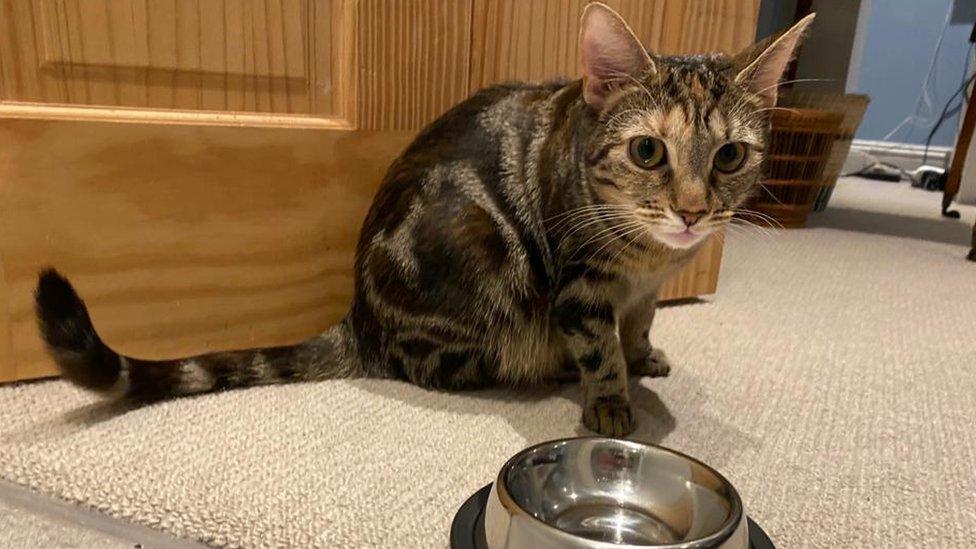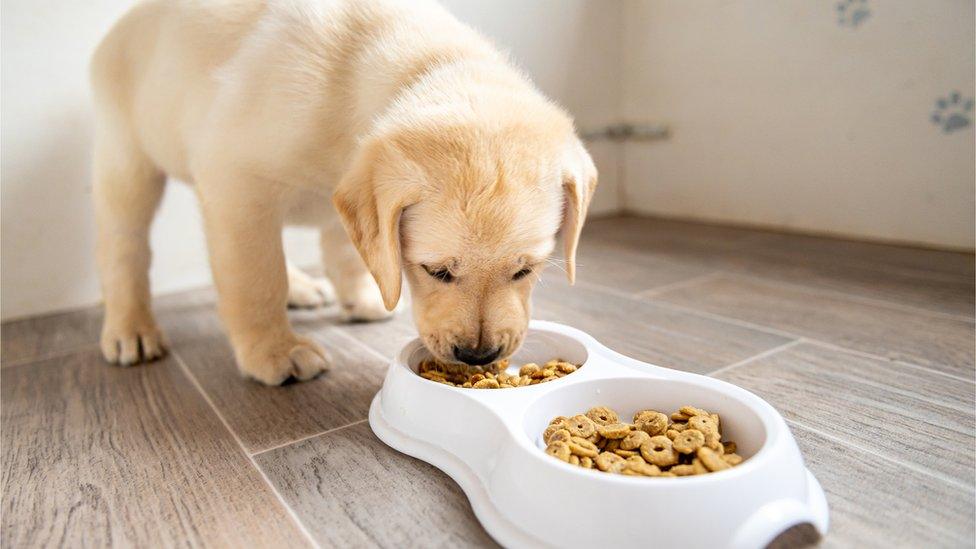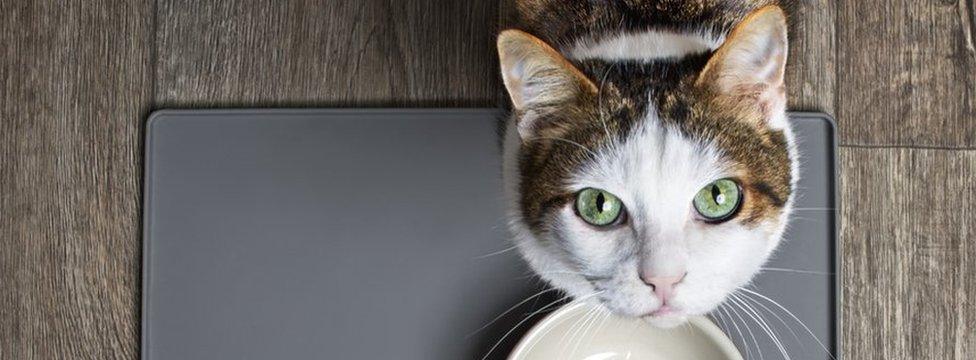Supermarkets warn pet boom causing food pouch shortages
- Published
- comments

UK supermarkets have warned of a shortage of some dog and cat food products following an "unprecedented" rise in pet ownership during lockdown.
Sainsbury's has apologised after running out of dog and cat food pouches due to a "national shortage", although tinned and dry food are unaffected.
Morrisons said it might not have "full availability for several months", but said it had enough stock for customers.
Waitrose is also running low, while Tesco has seen strong demand.
Sainsbury's said it was trying to resolve the issue but warned it would be "ongoing" in 2021.
It is blaming higher than usual demand for pouches after more pets were bought during lockdown.
Morrisons also said that there had been "an unprecedented rise in pet ownership across the UK" and it was seeing an "increase in demand".
A spokesperson for Morrisons said: "We're working closely with our suppliers who are investing in increasing their capacity and we may not have full availability for several months."
But the supermarket added that there was no need for people to start panic-buying pet food.
"We do have enough stock to support all our customers and their new pets and so there is no need for people to buy more than they need."
Tesco is believed to be working closely with suppliers to meet the needs of customers' pets, while Waitrose hopes to have its full range of pouches back on the shelves "as soon as possible".

Helen Warren-Piper, general manager of Mars Petcare UK, which makes Pedigree and Whiskas, said: "We recognise retailers are experiencing unusual demand for pet food during lockdown.
"We have made significant investment into our manufacturing network - including investment in our UK Melton pet food plant."
Pet food maker Purina said the UK market had "changed significantly" during the pandemic.
"We are experiencing unprecedented demand for our products, including cat food pouches where we have seen sales growth for our Felix and Gourmet brands at almost three times that of the market," it said.
"We have been working hard to meet this additional demand and are producing more pet food - including pouches - than ever before."
However, it added that consumers might find that some of its products "are not consistently available in their normal place of purchase".


Analysis:
Jonathan Josephs, business reporter, BBC News
Millions more of us have got used to cats, dogs and other pets yelping for food. Even before another surge during November's second lockdown more than two million Britons had taken on new pets. That should have been good news for the profits of pet food manufacturers but it's an industry that was already manufacturing at close to capacity.
It's not just the UK where demand for pet food is simply outstripping supply, but across Europe too; shortages are the inevitable results. Some owners have taken to feeding their animals other products, and that may have to be a growing trend.
There are also bigger global issues at play, with concerns that increased demand for wheat and grain in China could cause shortages of some ingredients in the supply chain.
One industry source said there has also been "more of a crunch because of Brexit" and the disruption that's caused with hauliers paperwork at UK borders.
Despite the financial constraints many people are facing the pet-care industry is regarded as recession-proof. It can take a lot of time and money to increase factory capacity but pet-food makers might have to do just that because after all; a dog is for life, not just for lockdown.

Pet owners reacted with humour and dismay on Twitter.
Some said Sainsbury's should have provided more information about the shortage when it emailed its customers about the issue.
The journalist Owen Jones said his cat was less than impressed.
Allow X content?
This article contains content provided by X. We ask for your permission before anything is loaded, as they may be using cookies and other technologies. You may want to read X’s cookie policy, external and privacy policy, external before accepting. To view this content choose ‘accept and continue’.
Allow X content?
This article contains content provided by X. We ask for your permission before anything is loaded, as they may be using cookies and other technologies. You may want to read X’s cookie policy, external and privacy policy, external before accepting. To view this content choose ‘accept and continue’.
There has been a well documented rise in pet ownership during the pandemic, with retail chain Pets at Home reporting strong sales and profits last year.
In November, it said that animals had been a "lifesaver" during lockdown, helping people through a period of "social loneliness".
The firm not only saw stronger demand for pets, but also related services such as its Vets at Home business.
Shoppers panic bought pet food during the first national lockdown in 2020 but there have been no reports of similar trends since then.
- Published26 February 2021

- Published24 November 2020
